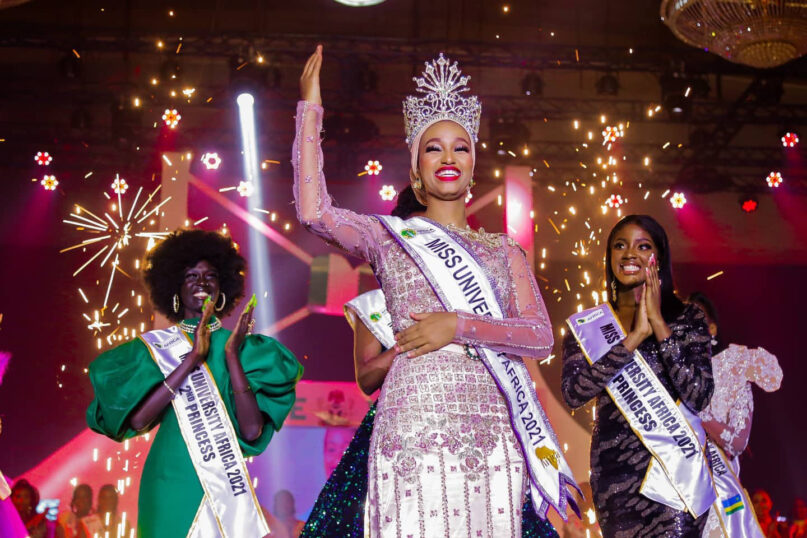NAIROBI, Kenya (RNS) — In late December, 23-year-old Adar Yusuf Ibrahim won Miss University Africa, a non-bikini, continentwide beauty pageant, becoming the first woman in Africa to win the title while wearing the hijab, the head covering worn by some Muslim women.
Ibrahim, who lives in Eastleigh, a Nairobi neighborhood that is home to many ethnic Somalis, represented Somalia, her country of birth. Somalia, where an Islamist war has been going on since 2006, is 99% Muslim.
She’s not the only young Muslim African to defy religious and cultural barriers to grace international beauty pageant catwalks in hijab, which traditionally, and sometimes controversially, is worn to signify modesty and privacy in Islam.
On Dec. 9, Shatu Garko, an 18-year-old hijab-wearing model from the northern state of Kano, was named Miss Nigeria, beating 17 other contestants.
RELATED: Former London Fashion Week designer pivots to modest fashion market
The two beauty queens appeared to follow in the footsteps of Halima Aden, a Somali American model who quit the fashion industry in November 2021 after she was allegedly forced to compromise her religious beliefs, but has recently returned, saying her mother had reminded her of the impact she could have on behalf of other young Muslim women.
But Muslim clerics and scholars in Africa are alarmed by the recent pageant winners, criticizing their participation as contrary to Islamic teachings and African culture.
“As a woman, exposing the body to people who have no right to see you is an abomination in Islam. A woman can only expose her body to her husband. If done, it’s against her culture, it’s against Islam and even against humanity,” Abdallah Kheir, a senior lecturer in religion in several Kenyan universities, told Religion News Service.
Kheir added that wearing hijab in a beauty pageant was “camouflage” meant to draw Muslim women into secular Western culture. “It’s not about the hijab. I think they want to attract more (Muslim) girls. There is a hidden agenda,” said Kheir.
Sheikh Abdullatif Sheikh, a cleric at Jamia Mosque, considered the seat of Islam in Kenya, said women should not be paraded like items for sale.
“Islam highly values the woman and her beauty is not made for everyone,” he said, while emphasizing that headscarves are meant to obscure Muslim women’s hair, not their brains, and that traditional dress does not mean a woman is backward or less educated, as critics of hijab often suggest.
Miss University Africa has been held annually since 2010 and draws contestants from 55 African countries. In the contest, bikinis and swimsuits are excluded. The winner of the pageant receives $50,000 in endorsement deals, a new car and is named a United Nations student ambassador.
Ibrahim arrived in Kenya with her family at age 11 and has always observed Islamic modesty. As she grew up and joined the fashion industry as a model, she kept her hijab.
“It was a personal choice even though I don’t think all Muslim women have to dress the same. I love it,” Ibrahim told the Daily Nation, a Kenyan newspaper. She hopes her win will inspire more women and girls to participate in pageants.
Garko, Miss Nigeria, won a prize of about $24,000, residency in a luxury apartment for a year and a new car. Her title will give her opportunities for marketing deals.
But reports say Shariah police in Kano had threatened to question her parents for allowing the teenager to participate in the pageant, which is “illegal and unknown to Islam,” and Garko said she received direct messages and comments that she was doing something wrong.
RELATED: Across Africa, hijab in schools divides Christians and Muslims
Covering the body with a simple headscarf or head-to-toe cloak is considered an act of worship for many Muslims and is also embraced in Christianity and Judaism, among other religions, in Africa.
Sheikh called for the respect of each other’s cultures and traditions, saying that a woman’s height, weight and figure added no value to her worth as a human.
“Our standard would be different,” he said. “You judge a lady as per intelligence, her morals and her behaviors and attitudes, other than her looks.”





